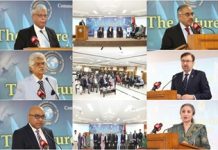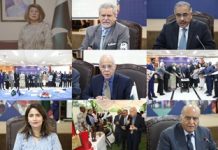True democracy rests on the principles of sharing power, working together in the public interest, dispersing powers widely among different institutions, and respecting the people’s mandate
One of the core issues in institutionalising democracy in any society is how to disperse power among different institutions of the state in order to prevent its being concentrated in any one of them. Any organ of the state or institution of the government arrogating all powers to itself would only create a dictatorship even if the person who occupies that institution or organ has been elected to that office. Popular elections offer no guarantee against the abuse and misuse of that power.
Political philosophers, statesmen and constitutional experts have grappled with this problem in all ages. With each struggle for the development of democracy in Western society, and with each phase of its refinement, the theory of separation of powers took deep roots in the political thinking of all men who sincerely believed in the promotion of true democracy.
At a time when we are once again thinking about the basics of democracy and how we can restore it in Pakistan, we need to seriously engage in a debate over the theory of separation of powers. The fundamental assumption about separating powers and allocating them to different institutions is to place checks and balances so that no one institution can jump its jurisdiction.
There are many common fallacies about what democracy is, and how it should function in Pakistan. The most basic one is about the right of the majority elected in the national and provincial assemblies and the authority of the governments that they form. In our feudal and immature political culture, governments often, by manufacturing majorities, can do anything from giving jobs to doling out public monies, granting loans and then writing them off. This is not a hypothetical narrative, but bitter facts from our political history.
The true spirit of democracy is that public offices and those who occupy them are the trustees of public good or public interest and they cannot under law be expected to do any thing different. In fact, the founders of the American constitution, which presents the best example of separation of power under federal arrangements, were very pessimistic about the majority. They feared that the majority, if not checked and balanced, would become tyrannical.
As trustees of public interest, the elected government represents all, and not just their own constituents. This includes the political minority and other different interests in the society. All societies are made of diverse interests and the objective of democratic process is how to negotiate a middle ground and balance one interest by another, particularly that of the political minority against the political majority.
The most important element of political philosophy behind what I have stated about democracy is that it is not about majority rule but about working together and determining commonalities through compromise and perpetual negotiation. This strengthens the political tradition of give and take and helps in building national consensus. The very nature of what is good in democracy is different; it is not about the ideal solution of social, economic and political problems but something on which the main actors and interest holders can agree.
The history of our constitutional development has constantly violated some of these fundamental principles of democratic development. Since the feudal-political culture is so deeply imprinted on our minds, we tend to think that unless the executive branch of the government is endowed with all the powers to make and shake the political world, we would not progress at all. It stands quite in contrast to the spirit of democracy and the political experience of societies that have gone through democratic change and have evolved into mature polities.
The 1973 Constitution has the great merit of being a consensus document. But in practical and theoretical terms it has failed to strengthen democracy and the rule of law in Pakistan. Its two features, parliamentary democracy and federalism, rest on our political heritage that can provide solid foundation to giving practical expression to the theory of separations of powers.
I believe the 17th amendment has considerably changed the fundamental structure of the Constitution; it has distorted its parliamentary character and put federalism under stress. Today, there is hardly any effective check on an executive given to abusing its powers. The checks could come from the legislature and the judiciary. The legislature is greatly fractured and the artificial majority with the uniformed president supporting it has tended to ignore the opposition both inside and outside the parliament. The Senate, the National Assembly, and the provincial governments have become the president’s preserve rather than acting as autonomous constitutional units to check and balance the executive or the federation.
The 17th amendment in fact is a parody of democracy. The parties supporting its passage had earlier, in 1997, supported the removal of 58 (2)(b). It is not the principle that matters; it is the political deal one can get and the meat in it. Lack of character, poor quality of leadership, a low level of commitment to democratic principles and institutional imbalance are factors that have subverted development of democracy in Pakistan.
The British and American democracies, the oldest ones, have institutional checks. The prime minister is first among equals and the collective responsibility before parliament holds the entire cabinet in check. There are internal and informal checks that come from within the ruling party; there are also checks from the outside from the media and civil society. In our case, cabinets handpicked by the prime ministers or presidents, have no independent judgement on any national issue of import; their members were, and still are, yes-men.
The party system is weak and remains top heavy with shallow grassroots support. And the tradition of challenging the party leaders from within is not well established. Dissenters are often shown the door.
In mature democracies, the media and the civil society offer considerable checks on the abuse of power. We can be rightly proud of our media and the civil society, particularly the lawyers, who played a historic role in defending and demanding the independence of judiciary. Without an independent judiciary we cannot hope to make our transition to democracy.
The question is: can we learn from our failures and chart a better course? It is not that democracy has failed; rather, we have failed democracy in the past because the individuals and groups exercising power were not willing to share power and transfer it to those who legitimately represented the popular will of the society. We will keep failing democracy if we continue to refuse ourselves the benefit of learning from our mistakes.
Let us remind ourselves that true democracy rests on the principles of sharing power, working together in the public interest, dispersing powers widely among different institutions, and respecting the people’s mandate.
The author is a professor of Political Science at the Lahore University of Management Sciences.












